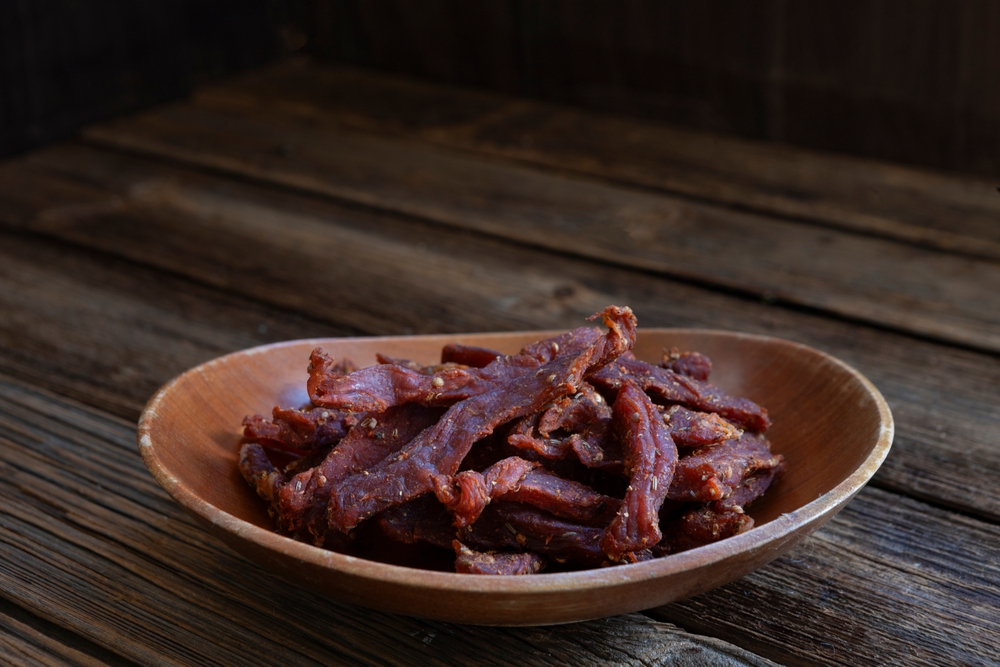There’s something magical about making your own jerky, especially when doing it the cowboy way. To make homemade jerky the cowboy way, start by selecting a lean cut of beef like flank steak or round. Cutting the meat into thin, even strips against the grain ensures a tender chew.
Once the meat is prepared, it’s time for the marinade. A traditional cowboy-style marinade might include ingredients like soy sauce, Worcestershire sauce, and a variety of spices. Let the beef soak for about four to six hours in the refrigerator, making sure every slice is well-coated and submerged.
After marinating, lay the slices on wire racks and set the oven to a low temperature, like 145°F to 175°F. The goal is to dry the meat rather than cook it. The process takes several hours but results in a flavorful, chewy snack that’s worth the wait. For more detailed steps, you can visit this recipe or another one.

Gathering Your Supplies
To make homemade jerky the cowboy way, you need high-quality meat, flavorful seasonings and marinades, and essential tools. The right combination of these elements ensures a delicious end product.
Selecting the Right Cut of Meat
Choosing the right meat is crucial. For the best results, opt for lean cuts with minimal fat, as fat can spoil and affect the jerky’s texture. Some ideal choices are rump roast, london broil, and brisket.
Visit your local butcher and ask for their leanest cuts. These selections provide a good balance of flavor and texture, making them perfect for jerky. Ensuring all visible fat is trimmed off before preparation is key to a quality finish.
Essential Seasonings and Marinades
Creating a flavorful marinade adds depth to your jerky. Start with a base that includes soy sauce, worcestershire sauce, and honey. Adding garlic powder, onion powder, chili flakes, liquid smoke, black pepper, and cayenne pepper enhances the flavor profile.
Mix these ingredients in a large bowl or ziplock bag to marinate the meat. The meat should be fully immersed in the marinade and left to soak for at least 4 hours or up to overnight. This process infuses the meat with robust flavors.
Tools of the Trade
Having the right tools makes the jerky-making process smoother. You will need a sharp knife for trimming and slicing the meat thinly and evenly. A dehydrator or an oven set to a low temperature (around 175°F) is essential for drying the meat.
Use wire racks placed over baking sheets if you’re using an oven. These racks allow air to circulate around the meat, drying it evenly and thoroughly. Additionally, paper towels are useful to blot off any excess moisture from the marinated meat before it goes into the dehydrator or oven.
Crafting Your Jerky
In crafting your jerky the cowboy way, the steps include selecting and preparing the leanest cuts of meat, thoroughly marinating to infuse flavor, employing traditional drying techniques, and storing properly to maintain freshness.
Preparing the Meat
Selecting the right cuts is essential. Lean cuts such as rump roast, London broil, or brisket are typically preferred. Excess fat should be trimmed off since fat can turn rancid over time. Placing the meat in the freezer for 1-2 hours makes it easier to slice.
Using a sharp knife, cut the beef into long, thin strips about ¼ inch thick. Slicing against the grain results in a more tender jerky, while slicing with the grain gives a chewier texture.
Applying Your Marinade
The marinade infuses the meat with rich flavors. A basic cowboy-style marinade may include soy sauce, Worcestershire sauce, honey, garlic powder, onion powder, chili flakes, liquid smoke, black pepper, and cayenne pepper.
To ensure even coating, mix the marinade ingredients in a large bowl or ziplock bag and add the meat slices. Thoroughly coat each piece and then refrigerate for at least 4 hours or overnight for deeper flavor infusion. Stir the marinade every few hours to ensure all pieces remain coated.
Drying Techniques
Traditional drying techniques involve using a smoker, oven, or dehydrator. For a smoker, maintain a low temperature around 145°F and let the jerky dry for 6-8 hours. Alternatively, an oven can be set at the same temperature with the door slightly open for ventilation.
Arrange the marinated strips on baking sheets or wire racks, ensuring none overlap. Drying in a dehydrator usually takes 4-6 hours, depending on the thickness of the meat and the specific model. Monitor the progress and rotate the strips for even drying.
Storing Your Homemade Jerky
Proper storage keeps homemade jerky fresh and flavorful. Once dried and cooled, store the jerky in airtight containers or vacuum-sealed bags. For short-term storage, keep the jerky in a cool, dry place for up to two weeks.
For longer preservation, refrigeration or freezing can extend the shelf life for several months. Always label the storage containers with the preparation date to efficiently track freshness. If any mold or off smells develop, discard the jerky immediately to avoid foodborne illnesses.
